Many custom options...
And formats...

Forgive Yourself in Chinese / Japanese...
Buy a Forgive Yourself calligraphy wall scroll here!
Personalize your custom “Forgive Yourself” project by clicking the button next to your favorite “Forgive Yourself” title below...
Forgive Yourself
Forgive Yourself / Release Yourself
我を許す is how to write “forgive yourself” in Japanese.
The first two characters mean “regarding myself.”
The last two characters mean “to forgive,” “to excuse (from),” “to pardon,” “to release,” “to let off,” “to permit,” “to allow,” and/or “to approve.”
Note: Because this selection contains some special Japanese Hiragana characters, it should be written by a Japanese calligrapher.
Forgiveness
恕 means to forgive, show mercy, absolve, or excuse in Chinese and Korean Hanja (though mostly used in compound words in Korean).
恕 incorporates the pictogram of a heart at the bottom, and a woman and a mouth at the top. The heart portion has the most significance, as it is suggested that it is the heart's nature to forgive.
In Asian culture, as with most other cultures, forgiveness is an act of benevolence and altruism. In forgiving, you put yourself in someone else's shoes and show them the kindness that you would want them to show you. Confucius referred to this quality as “human-heartedness.”
This in-stock artwork might be what you are looking for, and ships right away...
Gallery Price: $130.00
Your Price: $69.88
The following table may be helpful for those studying Chinese or Japanese...
| Title | Characters | Romaji (Romanized Japanese) | Various forms of Romanized Chinese | |
| Forgive Yourself | 原諒自己 原谅自己 | yuán liàng zì jǐ yuan2 liang4 zi4 ji3 yuan liang zi ji yuanliangziji | yüan liang tzu chi yüanliangtzuchi |
|
| Forgive Yourself Release Yourself | 我を許す | ware o yuru su wareoyurusu | ||
| Forgiveness | 恕 | shù / shu4 / shu | ||
| In some entries above you will see that characters have different versions above and below a line. In these cases, the characters above the line are Traditional Chinese, while the ones below are Simplified Chinese. | ||||
Successful Chinese Character and Japanese Kanji calligraphy searches within the last few hours...








